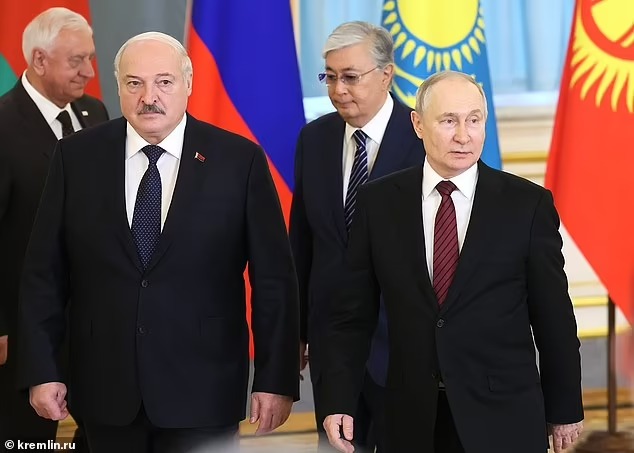Minsk, Belarus, June 15: Belarusian President Alexander Lukashenko has recently confirmed the commencement of deliveries for tactical Russian nuclear weapons. Lukashenko revealed that some of these weapons possess three times the power of the atomic bombs dropped on Hiroshima and Nagasaki in 1945.
The statements were made during an interview with the Rossiya-1 Russian state TV channel.
President Lukashenko, known for his strong rhetoric, emphasized that these nuclear weapons would be used against any aggression targeted at his nation.
“God forbid I have to make a decision to use those weapons today, but there would be no hesitation if we face aggression,” he declared. Lukashenko’s comments, released by his office, reiterated his determination to protect Belarus’s sovereignty at all costs.
This deployment marks Moscow’s first instance of moving such warheads, which are shorter-range and less powerful than intercontinental ballistic missiles, beyond Russia since the dissolution of the Soviet Union.
Unlike their larger strategic counterparts, tactical nuclear weapons are designed to eliminate enemy troops and weapons on the battlefield, with a short range and lower yield.
Belarus possesses a significant number of nuclear storage facilities inherited from the Soviet era, several of which have been restored.
While Belarus is currently receiving tactical nuclear weapons, President Lukashenko revealed that his country is also making preparations for the installation of intercontinental nuclear-tipped missiles.
The decision to introduce these weapons was announced by Russian President Vladimir Putin in March, who justified it by referencing the United States’ longstanding deployment of similar weapons in various European countries.
President Lukashenko’s statements, however, contradict Russian claims of retaining control over these facilities.
Unsurprisingly, the United States has criticized Putin’s decision, expressing concerns about the implications of expanding the deployment of tactical nuclear weapons.
However, the US maintains its stance on strategic nuclear weapons and has not observed any immediate signs of Russia’s intentions to employ nuclear armaments.
Nonetheless, The deployment of Russian nuclear weapons in Belarus has become a matter of keen interest for the global community.
The United States and its allies, as well as powers like India and China, are closely monitoring this development, particularly in light of the ongoing conflict in Ukraine.
Both India and China, who are recognised Russian friends, have repeatedly cautioned against the use of nuclear weapons in the Ukrainian war, and any increase in the presence of nuclear weapons in the region raises concerns about further escalation.
The international community including global peace activists remains deeply concerned about the potential consequences of an intensifying nuclear race. Lukashenko’s assertions and the ongoing deployment of Russian nuclear weapons have further raised anxieties about global security and efforts to promote non-proliferation.
Belarus, Russia’s one of few allies in the region has been hosting Russian military hardware and forces attacking Ukraine as part of what Moscow calls its “special military operation.
Lukashenko who has been in power for 29 years, making him one of the longest-serving leaders in the world, relies on Russia’s support, both politically and economically. It has been instrumental in Lukashenko surviving widespread protests, mass arrests, and international sanctions following the controversial 2020 election.
How the United States and NATO respond to this development will determine whether the nuclear race reintensifies in Europe, returning back to the Cold War era.






